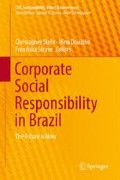Abstract
The adoption of standards and tools has been an important element of the CSR-movement in Brazil, and organizations in the country have turned out to be pioneers in using voluntary certification schemes or contributed to standards such as ISO26000 which has been developed under common leadership of Brazil and Sweden. Today, Brazil is a leading country in terms of commodity based CSR-certifications and has introduced mandatory CSR-reporting regulations for the energy, public company and banking sector. Since the launch of the first Ethos Indicators for Social Responsibility, the number of companies that apply standards and report against the GRI or IIRC-Frameworks has constantly grown. This chapter describes the evolution and formalization of the CSR-movement in Brazil and analyzes how a pre-existing company culture of quality certifications has favored the fact that many organizations adopted voluntary CSR-certifications schemes. Based on expert consultations and data collection, it highlights the most important standards used in Brazil and tries to respond to the question, if standardization has helped to prevent a major “backlash” of CSR-practices during the economic crisis or if important areas of sustainability management have suffered retraction.
Access this chapter
Tax calculation will be finalised at checkout
Purchases are for personal use only
Notes
- 1.
Parts of this article are based on Grüninger (2009).
- 2.
Instituto Ethos is the main CSR-organization in Brazil and has also influenced the movements in other Latin American Countries: www.ethos.org.br
- 3.
Abrinq is the acronym of the association of toy producers in Brazil. The Abrinq Foundation was one of the first industry associations with a focus on CSR-projects.
- 4.
Members and results of the program of “Child Friendly Companies” are published on the website: https://www.fadc.org.br/programas-institucionais/protecao-empresa-amiga-da-crianca
- 5.
Fischer and Falconer (2000).
- 6.
Fischer and Falconer (2000, p. 64).
- 7.
A short overview on the CLT can be found on: http://www.swisscam.com.br/12.-labor-law-in-brazil-a-brief-overview.html
- 8.
- 9.
Two important news agencies that denounce slave and child labour conditions.
- 10.
Santa Elisa sugar factory reported a 34% production increase to 12% reduction of absenteeism after certification.
- 11.
Guillardi (2006) and internal data of BSD Consulting, São Paulo.
- 12.
Indicators applied by the author and his team on a sample of factories corroborated this conclusion.
- 13.
Instituto Observatório Social (2004).
- 14.
Corporate Social Responsibility management is understood—according to ISO26000—as a multi-faceted management approach that, like quality, should be integrated into all aspects of how a company conducts its business, see for a wider discussion: http://www.triplepundit.com/2011/03/iso-26000-definition-social-responsibility
- 15.
The set of Indicators can be accessed online or being downloaded as PDF at: https://www3.ethos.org.br/conteudo/indicadores/#.WdbLbVtSzIU
- 16.
ISE: Indíce de Sustentabilidade Empresarial.
- 17.
- 18.
- 19.
- 20.
For a discussion on certifications of commodities in Brazil see: https://www.isealalliance.org/online-community/resources/responsible-production-and-consumption-in-brazil-trends-in-certification-report-dec
- 21.
FSC: Forest Stewardship Council.
- 22.
- 23.
- 24.
- 25.
- 26.
- 27.
Grüninger and Schiesari (2014).
- 28.
Fairtrade International (2008).
- 29.
A similar conclusion was made for workers on UTZ certified farms.
- 30.
Pioneers such as C&A and Renner already certified 100% of their supply chain, the list of member companies of the ABVTEX certification can be found at: http://abvtex.org.br/index.php?option=com_content&view=article&id=356&Itemid=62&lang=pt
- 31.
So far unpublished data of an impact study commissioned by ABVTEX in 2016.
- 32.
One of the major social auditing schemes globally, the Business Social Compliance Initiative (BSCI), informed the author, that, globally, 9422 companies in the apparel sector were in its database (e-mail communication, October 14, 2016).
References
Bluhm, E., Grüninger, B., & Schiesari, C. (2015). Effects of UTZ certification according to coffee farmers in Brazil. Utz certified. https://www.utz.org/wp-content/uploads/2015/12/Effects_of_UTZ_Certification_according_to_Brazilian_farmers_2015.pdf
Fairtrade International. (2008). A methodological guide for assessing the impact of Fairtrade. Prepared by Nicolas Eberhart and Sally Smith. Bonn. http://fairtrade.net
Fischer, R. M., & Falconer, A. (2000). O selo social contra o trabalho infantil – experiências brasileiras, CEATS-USP and OIT. Discussion paper provided University of São Paulo, based on impact research realized in 1999 and 2000.
Guillardi, C. R. (2006). Certificação Social: Um Estudo Sobre Os Benefícios Da Norma SA8000 em Empresas Certificadas. Universidade Municipal De São Caetano Do Sul.
Grüninger, B. (2009). The impact of SA8000 in Brazil. In D. Leipziger (Ed.), SA8000: The first decade: Implementation, influence, and impact. New York: Routledge First published by Greenleaf Publishing.
Grüninger, B., & Schiesari, C. (2014). Assessing the benefits of Fairtrade Orange Juice for Brazilian small farmers. Fairtrade International. http://www.fairtrade.net/fileadmin/user_upload/content/2009/resources/1404-Assessing_the_benefits_of_Fairtrade_Orange_Juice.pdf
Instituto Observatório Social. (2004). Responsabilidade Social Empresarial. Perspectivas para Atuação Sindical. Florianópolis. https://www.observatoriosocial.org.br
Author information
Authors and Affiliations
Corresponding author
Editor information
Editors and Affiliations
Rights and permissions
Copyright information
© 2019 Springer International Publishing AG, part of Springer Nature
About this chapter
Cite this chapter
Grüninger, B. (2019). CSR and Management Practices: The Role of CSR-Standards in Brazil. In: Stehr, C., Dziatzko, N., Struve, F. (eds) Corporate Social Responsibility in Brazil. CSR, Sustainability, Ethics & Governance. Springer, Cham. https://doi.org/10.1007/978-3-319-90605-8_2
Download citation
DOI: https://doi.org/10.1007/978-3-319-90605-8_2
Published:
Publisher Name: Springer, Cham
Print ISBN: 978-3-319-90604-1
Online ISBN: 978-3-319-90605-8
eBook Packages: Business and ManagementBusiness and Management (R0)

